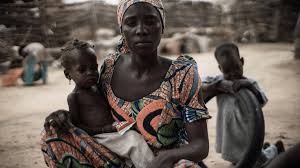In Nigeria, where the wealth gap is stark and opportunities are often limited by socioeconomic status, the health of women and girls is profoundly influenced by their economic circumstances. Socioeconomic status (SES) affects access to nutrition, healthcare, and education, all of which are crucial for maintaining biochemical health. Understanding these disparities is key to promoting equity and improving health outcomes.
The Biochemical Toll of Poverty
Poverty and low SES can lead to several biochemical health issues:
- Nutritional Deficiencies: Limited access to nutritious food can result in deficiencies in essential vitamins and minerals, affecting everything from immune function to cognitive development.
- Chronic Stress: Financial instability and social pressures create chronic stress, leading to elevated cortisol levels and associated health problems.
- Inadequate Healthcare: Lack of access to healthcare services means preventable conditions often go untreated, exacerbating health disparities.
The Nigerian Context
In Nigeria, where economic disparities are pronounced, the impact on biochemical health indicators is significant. Women and girls from lower SES backgrounds face greater challenges in accessing the resources needed for optimal health. This includes everything from prenatal vitamins for pregnant women to adequate nutrition for growing girls.
Unveiling the Mechanisms of Socioeconomic Status on Biochemical Health Indicators in Nigerian Women and Girls
Research into the influence of SES on biochemical health reveals several key mechanisms:
- Micronutrient Deficiencies: Deficiencies in iron, iodine, and vitamins such as A and D are common among those with low SES, leading to anemia, cognitive impairments, and weakened immune systems.
- Stress Biomarkers: Higher levels of stress biomarkers such as cortisol and inflammatory markers are found in individuals from lower SES backgrounds, increasing the risk of chronic diseases.
- Epigenetic Changes: Poverty and stress can lead to epigenetic modifications that affect gene expression, potentially leading to long-term health consequences.
Bridging the Gap of Socioeconomic Status on Biochemical Health Indicators in Nigerian Women and Girls with Research and Policy
Addressing the biochemical health disparities caused by SES requires a multifaceted approach:
- Nutritional Programs: Implementing programs that provide access to nutritious food and supplements can help alleviate micronutrient deficiencies.
- Healthcare Access: Expanding healthcare services, particularly in underserved areas, can ensure early intervention and treatment of health issues.
- Stress Reduction Initiatives: Programs aimed at reducing chronic stress through community support, mental health services, and financial assistance can mitigate the biochemical impact of poverty.
A Path Forward
Addressing the influence of SES on biochemical health indicators in Nigerian women and girls requires a comprehensive approach:
Community Education: Raising awareness about the importance of nutrition and healthcare access can empower communities to seek out resources and support.
Policy Initiatives: Government policies that prioritize health equity and provide support for low-income families can make a significant difference.
Support Networks: Establishing community-based support groups can provide emotional and practical support for women and girls facing economic challenges.
Toward Equity and Health
By understanding and addressing the biochemical health disparities caused by socioeconomic status, we can promote equity and improve health outcomes for Nigerian women and girls. This approach not only enhances individual well-being but also strengthens the fabric of society, fostering a healthier, more equitable future for all.
- Exploring the Neuroimaging of Infertility-Related Stress: A Nigerian Perspective - May 1, 2023
- The Silent Battle: Investigating the Biochemical Effects of Chronic Stress in Nigerian Women Facing Gender-Based Violence - March 22, 2023
- The Biochemical Effects of Estrogen Therapy in Transgender Women - March 7, 2023


